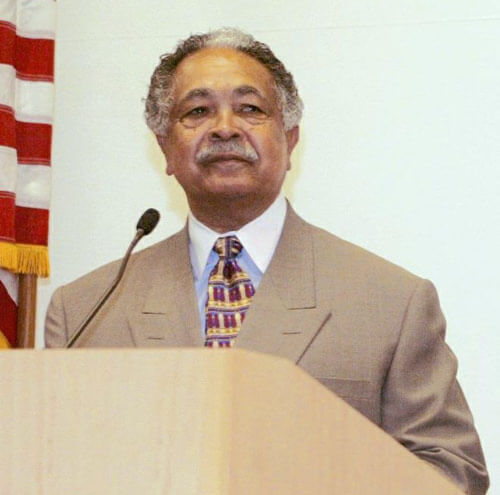Broadway’s fall musical season kicked off recently with a delightful treat called “Chaplain.”
The entertaining and enlightening stage musical about Hollywood’s mustached, silent film character that endeared audiences as The Little Tramp is now playing at the Barrymore Theater.
Loaded with nostalgic songs, frolicking dance and a mountain of historical data, the production stars Rob McClure in a biographic tribute to the London-born entertainer who migrated to America and became the allure of world-wide, viewing audiences.
Directed by Warren Carlyle, the life of Charlie Chaplain unfolds from his youthful years accompanying his mother Hannah (Christiane Noli) through the slums of the city of London and out into the dream world of the better neighborhoods where she mocked pretentious and unworthy citizens.
Carlyle quickly progresses to adolescence when Charlie had to wait while she worked the seedy night-spots singing and dancing to patrons there to drown out the depression of the war.
She sang and danced for pennies and shillings.
With his brother Sydney (Wayne Alan Wilcox), the two encountered tough times keeping pace with their struggling, single mom.
As the story goes, little Charlie Chaplain picked up a few tips in the pub. The first was to be ready to stand-in for the top talent.
When his mom proved unable, Chaplin stepped up and immediately gained traction with the often boisterous customers.
Throughout the years, Chaplain’s talent grew bigger and bigger until he was discovered by an American. How Charlie Chaplain made it to the California coast and into the moving picture business becomes entrancing stage production.
Soon, a baggy-pants wearing, penguin-like walker charms America, gains status, becomes a successful millionaire and dares to mimic German tyrant Adolf Hitler.
By intermission, much more is revealed with revelations from scandals surrounding his favoring of girls half his age, multi-marriages, a Congressional investigation and ultimately self-exile to Switzerland.
A dark pall seems to fall over the audience when Chaplain vows never to return to the United States after experiencing federal scrutiny and defamation by the media.
By the time the production ends, spirits rise with “Chaplain” back in good stead with the American public and an adoring audience.
If “Chaplain” is any indication, The Great White Way is in for a jolly good season.
NOLLYWOOD’S “BLACK NOVEMBER” GOES GLOBAL FROM HOLLYWOOD TO UN
“This is the first time an African story with a cast of Africans and sponsored by Africans is being told by Africans,” Nigerian director Jeta Amata said at the premiere showing of his film “Black November.”
Screened at the United Nations on the same day Iran’s President Mahmoud Ahmadinejad and Zimbabwean President Robert Mugabe addressed a world body at the General Assembly Haitian-American singer/producer Wyclef Jean, Senegalese-American rapper/singer Akon , activist Al Sharpton and boxing and film promoter Don King joined foreign diplomats to see a document about the under-reported, critical conditions that exists in the Niger Delta region of the west African nation.
Illinois Congressman Bobby Rush also made it to the world stage for the important screening. Reportedly, after first seeing the film at a showing at the Kennedy Center in Washington, D.C. the legislator sponsored a bill to start clean up of the polluted areas and convinced Congress to action on behalf of the Nigerian people.
The film’s title could have been “Black Gold.”
However, that might have been limiting and far less comprehensive to this revealing film about the world’s seventh most populous country, corruption, media manipulation and greed prevalent in Nigeria.
Acclaimed the fifth largest supplier of oil in the world, Nigeria oozes black gold.
Oil is at the root of the tragic tale.
“One out of three Americans use Nigeria’s oil, every single day,” filmmaker Amata said.
While that resource may seem a blessing for the nation, its refineries also prove to be a curse on the poor villagers who are the least of the benefactors to the trillion dollar annual production.
For many, death and destruction gushes along the pipe-line with frequent spills and a criminal cartel that followed the orders of a military coup depicted ruling the West African nation.
Political change is now the order of the day there.
It came after a democratic election stabilized the country.
But the pollution of streams and other waterways have contaminated fishing areas and will remain oily for probably generations.
Amata combines real life tragedy with Hollywood dramatics to feature Mickey Rourke, Kim Bassinger and Vivica Fox as accessories to criminal activity and tribal corruption.
Akon and Jean portray rebel leaders.
Vivid scenes of political strife, death squads, alleged accidents and militancy imported to the west coast of the USA dramatize the urgency of the problem in West Africa.
Magnified in high definition for the world to ponder, “Black November” reveals the plight of thousands of citizens who have died.
The film spotlights the travesty surrounding corporate investments in oil in the Niger Delta region of Africa and exposes in a powerful manner the exploitation of a people.
“Black life must have value,” Sharpton said after seeing the film.
King who is an investor in the film echoed similar sentiments.
Catch You On the Inside!
























